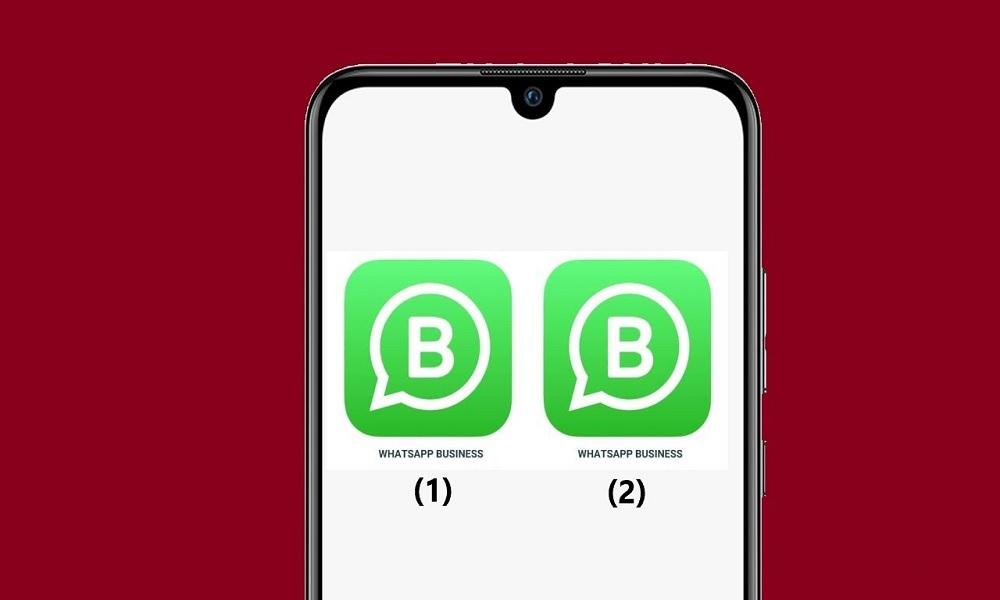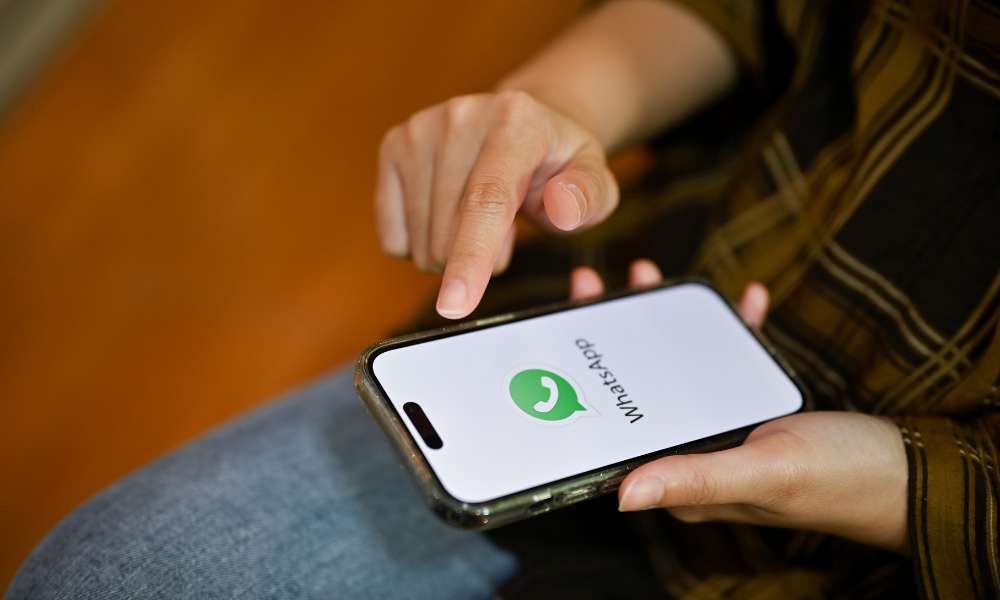How to Check Someone Else's WhatsApp: 6 Proven Methods for Message Access

Understanding how to check someone else's WhatsApp has become increasingly relevant for parents monitoring children's messaging, employers overseeing company devices, or those with other legitimate monitoring needs.

While WhatsApp implements strong privacy features including end-to-end encryption, several methods exist for accessing message content and activities when you have appropriate authorization or legitimate monitoring requirements.
Signs That Indicate You May Need to Check Someone Else's WhatsApp
Certain behavioral patterns and concerning situations may legitimately warrant consideration of WhatsApp monitoring for safety, security, or family protection purposes.
Warning signs that might justify WhatsApp monitoring include children exhibiting sudden behavioral changes, secretiveness about online activities, or concerning new contacts; elderly family members showing signs of potential scams or exploitation through messaging.
Additionally, situations involving suspected cyberbullying, inappropriate contact from strangers, potential involvement in dangerous online activities, or evidence of manipulation by unknown individuals may create legitimate monitoring needs.
However, these concerns should be balanced against privacy considerations and addressed through appropriate monitoring methods that respect legal boundaries and relationship dynamics while addressing genuine safety or security risks.
What It Means to Check Someone's WhatsApp Messages
Learning how to check someone else's WhatsApp involves gaining access to private conversations, media, and activity information either through direct device access, specialized monitoring applications, or alternative technical methods.
This type of access allows viewing of sent and received messages, shared media, contact interactions, and sometimes even deleted content depending on the method used.
The appropriate approach depends on your relationship with the monitored person, your legal standing, and specific monitoring objectives.
SafeMyKid - The Most Comprehensive WhatsApp Monitoring Solution

When exploring how to check someone else's WhatsApp messages effectively, SafeMyKid provides the most comprehensive monitoring solution through its advanced surveillance capabilities.
This powerful application circumvents WhatsApp's encryption to provide complete visibility into messages and activities.
SafeMyKid works by capturing WhatsApp data directly from the device interface, allowing it to record conversations, media sharing, and contacts even with end-to-end encryption in place.
Its sophisticated technology makes it particularly effective for parents monitoring children's communications or employers overseeing company devices.
Key Features of SafeMyKid to Check Someone Else's WhatsApp
When it comes to how to check someone else's WhatsApp thoroughly, SafeMyKid offers advanced capabilities that make WhatsApp monitoring both effective and comprehensive:
Complete Message Access —— Instantly view all WhatsApp messages, including sent, received, and deleted texts across individual and group chats.
Call Monitoring —— Track all WhatsApp voice and video calls with detailed logs, including timestamps, durations, and contact info.
Media File Tracking —— Access all shared media files, including images, videos, voice notes, and documents, even if deleted from chats.
Keyword & Contact Alerts —— Set alerts for specific keywords or contact names, and receive notifications when flagged content is detected.
Cross-Platform Compatibility —— Works seamlessly on both Android and iOS devices, regardless of WhatsApp version or updates.
User-Friendly Dashboard —— Navigate all tracked WhatsApp data through an intuitive, remote-access online control panel.
How to Set up SafeMyKid to Check Someone Else's WhatsApp
Setting up SafeMyKid for WhatsApp monitoring requires just a few straightforward steps to begin tracking all messaging activities.
Step 1.Create Your SafeMyKid Account
Visit the SafeMyKid website to register and create your monitoring account.

Step 2.Set up The SafeMyKid App
For Android: Install the SafeMyKid app directly on the target device (requires brief physical access). For iOS: Use iCloud credentials to enable monitoring without physical access to the device.
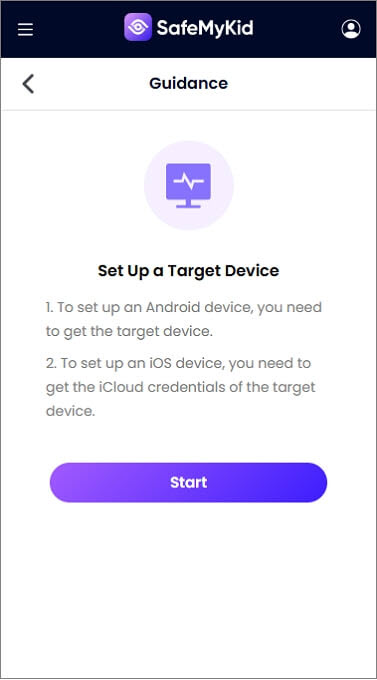
Step 3.Begin Checking Someone Else's WhatsApp
Access your secure dashboard to view WhatsApp messages, media content, and contact interactions remotely.
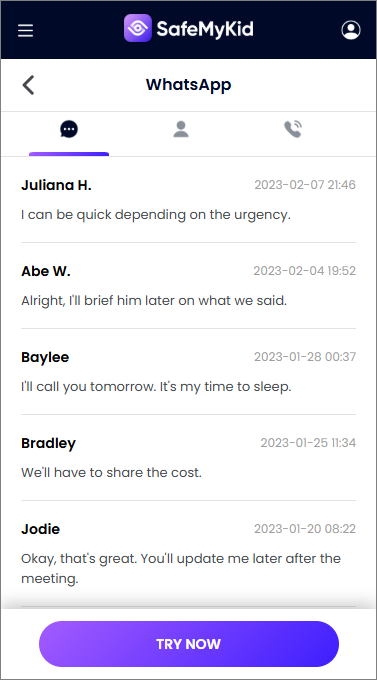
5 Other Methods to Check Someone Else's WhatsApp
While SafeMyKid offers the most comprehensive solution, several other approaches can help you access WhatsApp communications. Here's an overview of six additional methods for how to check someone else's WhatsApp.
1. WhatsApp Web Method
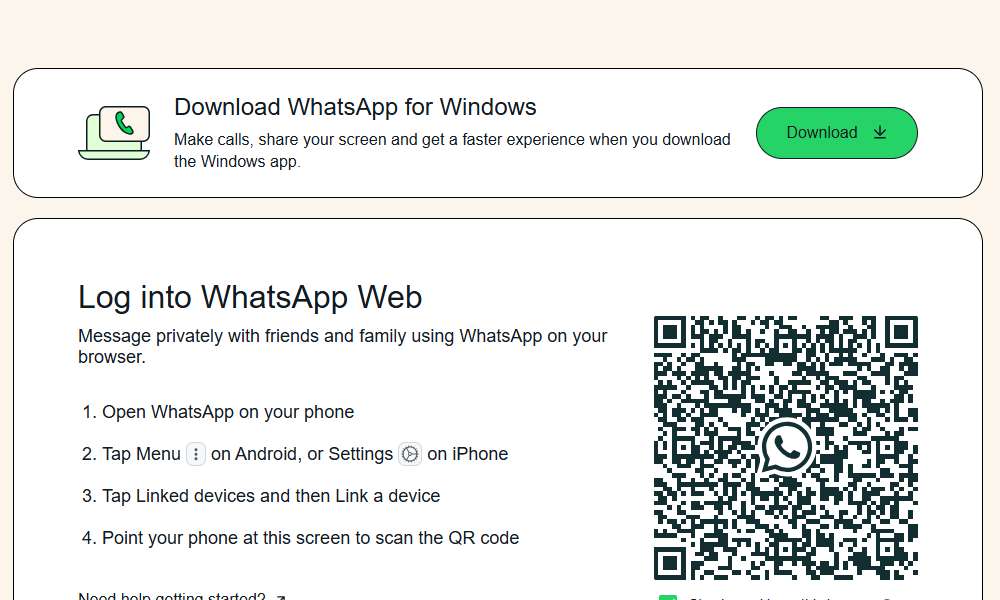
The WhatsApp Web method provides a direct approach to how to check someone else's WhatsApp through the platform's official desktop connection system. This approach uses WhatsApp's QR code linking feature to mirror phone conversations on a computer.
To implement this method, you need brief access to the target's unlocked phone to scan the QR code on the WhatsApp Web page (web.whatsapp.com). Once connected, the computer retains access to all WhatsApp communications until manually logged out, allowing ongoing message monitoring.
Pros:
- Uses official WhatsApp features without third-party tools
- Shows complete message history and all conversations
- Provides real-time updates as messages arrive
- No additional software installation required
Cons:
- Requires physical access to the unlocked phone
- Creates a notification on the phone showing "WhatsApp is active on other devices"
- User can easily terminate the connection remotely
2. Phone Clone Applications
Phone cloning applications offer another approach to how to check someone else's WhatsApp by creating a mirrored copy of the target device on a secondary phone. These specialized apps duplicate content from one device to another, including WhatsApp data.
This method requires temporary access to both phones simultaneously during the cloning process. Once completed, the clone receives a copy of WhatsApp data, though ongoing synchronization typically requires additional steps or regular re-cloning to see new messages.
Pros:
- Creates a complete copy of WhatsApp data at the time of cloning
- Works without ongoing connection to the target device
- Provides access to message history and media
- One-time process that doesn't require continuous access
Cons:
- Requires significant physical access to the target phone
- Doesn't automatically update with new messages
- May trigger security alerts on newer devices
3. WhatsApp Backup Access

WhatsApp creates regular backups of messages to cloud services (Google Drive for Android, iCloud for iOS), which can be accessed as another method for checking someone else's WhatsApp communications historically.
This approach requires access to the target's cloud storage credentials (Google or Apple ID) and sometimes phone number verification. By restoring a WhatsApp backup to another device, you can view message history up to the most recent backup point.
Pros:
- Provides access to extensive historical message data
- Works without direct phone access in some cases
- Reveals deleted messages that were included in backups
- Official backup systems contain comprehensive data
Cons:
- Requires cloud service credentials
- Only shows messages up to the last backup time
- Complicated restoration process with technical challenges
4. Physical Device Inspection
The most straightforward method for how to check someone else's WhatsApp involves direct physical access to their unlocked device. This traditional approach provides immediate visibility into all WhatsApp activities without technical complications.
This approach works when you have the person's permission or legitimate authority, such as parental access to a child's device. While simple in concept, this method requires either an unlocked phone or knowledge of the security credentials to gain access.
Pros:
- No additional software or technical knowledge required
- Shows exactly what appears in the WhatsApp application
- Access to all features including calls, status, and settings
- Works regardless of device type or WhatsApp version
Cons:
- Requires physical possession of the unlocked device
- Leaves evidence of access in "last seen" status
- Only provides monitoring during actual access periods
5. WhatsApp Export Feature
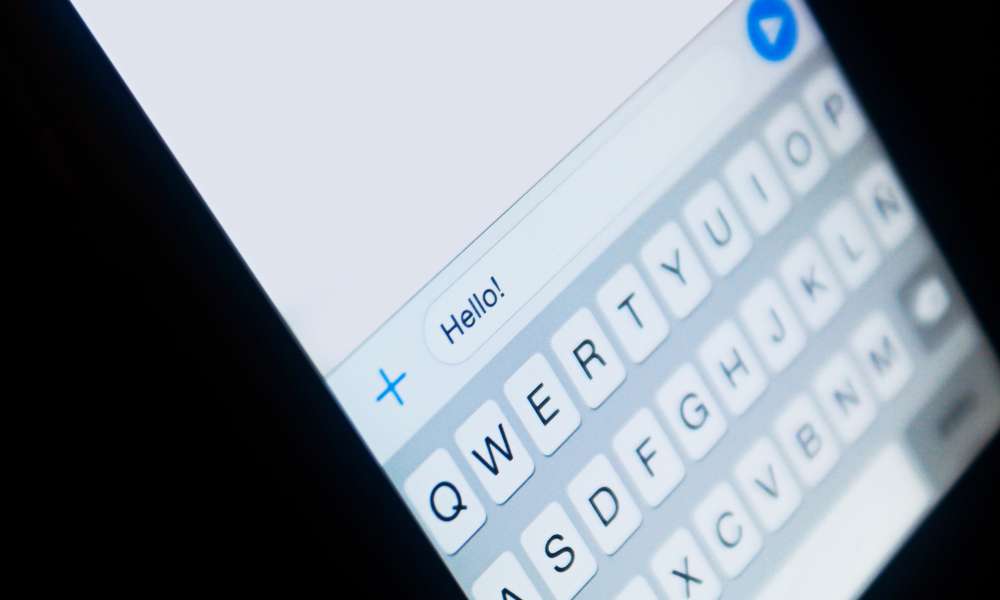
WhatsApp's built-in chat export feature offers another approach to checking someone else's WhatsApp by generating shareable conversation archives. This official feature creates text or HTML files containing complete message histories for specific chats.
This method requires brief access to the unlocked phone and the WhatsApp application. By selecting conversations and using the "Export Chat" option, you can send complete message logs to email, cloud storage, or other applications for later review.
Pros:
- Creates permanent records of conversations
- Includes media files when selected
- Uses official WhatsApp features without third-party tools
- Easy to implement with minimal technical knowledge
Cons:
- Requires direct access to the unlocked phone and WhatsApp app
- Only captures messages up to the export time
- Must be repeated for each conversation of interest
How to Choose The Right Method to Check Someone Else's WhatsApp
Selecting the most appropriate approach to check someone else's WhatsApp requires careful evaluation of your specific circumstances, technical capabilities, and the level of monitoring detail needed for your situation.
Begin by assessing your relationship with the WhatsApp user and your legal standing to monitor their communications, as this determines which methods are appropriate and legally permissible in your jurisdiction.
Consider your technical expertise level, as some methods like SafeMyKid require minimal technical knowledge while others like database access or SIM cloning demand advanced skills and specialized equipment.
Evaluate the target device type and accessibility, determining whether you have regular physical access, occasional access, or must work remotely, as this significantly impacts which monitoring approaches will be feasible.
Factor in your budget constraints and time limitations, weighing free methods that may have limited functionality against premium solutions that offer comprehensive monitoring, and consider whether you need real-time monitoring or periodic access to WhatsApp communications.
Situations Where Checking Someone's WhatsApp May Be Necessary
Understanding the legitimate contexts for accessing WhatsApp communications helps ensure this capability is used appropriately:
Parental Oversight —— Parents monitor their minor children's messaging to ensure safety and prevent inappropriate communications.
Business Security —— Employers accessing company-provided devices to ensure appropriate business use and compliance with policies.
Account Recovery —— Assisting with message recovery when someone changes devices or needs to restore communications.
Legitimate Concerns —— Addressing verified safety issues where direct communication isn't possible or effective.
Explicit Agreement —— Situations where the person has given permission for monitoring for specific purposes.
These legitimate scenarios highlight why understanding how to check someone else's WhatsApp serves important protective and oversight functions when used appropriately and legally.
Frequently Asked Questions about Checking Someone's WhatsApp
Here are answers to common questions about accessing WhatsApp communications:
1. Can I check someone's WhatsApp messages without having their phone?
Yes, certain methods allow remote WhatsApp monitoring without ongoing physical access. Solutions like SafeMyKid can provide access after initial setup, while iCloud or Google Drive backup access methods sometimes work without any physical access.
However, most reliable methods require at least brief initial access to the device.
2. Will the person know if I'm checking their WhatsApp?
It depends on the method used. Direct approaches like WhatsApp Web leave visible indicators showing "WhatsApp is active on other devices," while sophisticated monitoring solutions like SafeMyKid operate invisibly.
The person's technical knowledge and attention to security details also affect detection likelihood.
3. Can I see deleted WhatsApp messages from someone else's account?
Yes, specialized monitoring applications like SafeMyKid can often capture and preserve WhatsApp messages before deletion, allowing you to view content that has been removed.
Some backup access methods may also contain deleted messages if they were included in the backup before deletion.
4. Is it legal to check my child's WhatsApp messages?
Parents generally have legal rights to monitor their minor children's communications, including WhatsApp messages, though specific regulations vary by location.
This parental authority typically allows for both direct device access and monitoring software installation for legitimate safety and supervision purposes.
5. How can I tell if someone is checking my WhatsApp?
Signs someone might be monitoring your WhatsApp include WhatsApp Web notifications, unusual battery drain, unexpected "online" or "typing" status appearances, unknown devices in your Google/Apple account's logged-in devices list, or suspicious background processes running on your phone.
Conclusion
Learning how to check someone else's WhatsApp involves understanding both the technical methods available and the important legal and ethical considerations that should guide their use.
While multiple approaches exist, from dedicated applications like SafeMyKid to direct access methods, the appropriate choice depends on your specific situation and legal standing.


